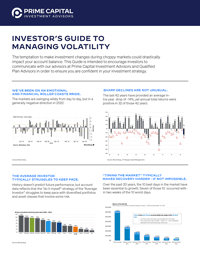Understanding tax considerations is crucial in passive investing. From distinguishing between short-term and long-term gains to managing dividends and knowing one’s tax bracket, informed decisions can help maximize after-tax returns. Explore these seven key tips discussed by financial advisors Jason Noble and Andy Merchant on the most recent episode of their podcast “Understanding Passive Income.” These tips may help you optimize your passive investment strategy to potentially enhance your financial outcomes.
- The Importance of Tax Efficiency
It’s important to understand how investment gains are taxed. It’s not just about what investors make, but what they keep after taxes. This principle is fundamental in optimizing investment efficiency and ensuring that investors are not caught off guard during tax season.
- Short-Term vs. Long-Term Gains
Short-term gains, which apply to investments held for less than 365 days, are taxed as ordinary income. In contrast, long-term gains, applicable to investments held for more than 365 days, benefit from lower capital gains tax rates. Understanding these distinctions is critical for making informed investment decisions. (Note: High income earners may be subject to an additional net investment income tax on both short-and-long term capital gains.)
- The Role of Dividends
Qualified dividends benefit from lower tax rates, similar to long-term capital gains, while non-qualified dividends are taxed at ordinary income rates. This distinction is crucial in planning and managing an investment portfolio to maximize after-tax returns.
- Knowing Your Tax Bracket
Another essential aspect is the importance of knowing one’s tax bracket. Those in lower tax brackets may not need advanced tax strategies, whereas higher brackets necessitate more sophisticated planning. For instance, knowing whether to choose tax-deferred or tax-exempt investment options can significantly impact overall tax efficiency.
- Tax Efficiency in Practice
It’s important to work with financial advisors who incorporate tax considerations into their planning. For example, understanding the tax implications of Treasury bills and other investments can help investors avoid unnecessary tax burdens and maximize their after-tax returns.
- Collaboration with Professionals
Collaborating with tax professionals, financial advisors, and/or attorneys can help ensure comprehensive and well-informed investment decisions. Consider building a team around you rather than handling your investments on your own.
- Liquidity Considerations
Liquidity is another critical factor in passive investing. While some investments may lack liquidity, it’s important to balance the need for accessible funds with the possible benefits of higher returns from less liquid assets. Investors must understand both the tax benefits and the exit strategies associated with their investments to make informed decisions.
In conclusion, optimizing passive investment strategies within your personal tax framework may enhance returns, and may bring financial peace of mind. Investors are encouraged to consult with professionals from multiple disciplines to tailor investing strategies to their specific circumstances. What works for one investor may not work for another, making personalized advice crucial.
For more insights, join Jason Noble and Andy Merchant in the next episode of their podcast “20 Minutes of Clarity” to explore various tools and resources to help monitor and manage investment paths.
About 20 Minutes of Clarity
“20 Minutes of Clarity,” hosted by Jason Noble and Andy Merchant, aims to demystify the world of financial planning and investing. Each week, they spend 20 minutes explaining complex financial concepts in an engaging and informative manner. Whether through podcasts or videos, their goal is to educate and empower listeners on their journey to financial freedom and success. Join them for real conversations about economic events, new legislation, technologies, political changes, and other matters impacting personal wealth and portfolios.
If you’re ready to get started, or if you’re looking for a second opinion on your current strategy, remember, we are here to help with the complexities of retirement planning while keeping your financial goals in focus. Give Jason Noble a call today at (843) 743-2926 to take the first step toward designing a portfolio tailored to your retirement dreams.
Source: https://www.fidelity.com/learning-center/smart-money/capital-gains-tax-rates
This information does not constitute legal or tax advice. PCIA and its associates do not provide legal or tax advice. Individuals should consult with an attorney or professional specializing in the fields of legal, tax, or accounting regarding the applicability of this information for their situations.
Advisory products and services offered by Investment Adviser Representatives through Prime Capital Investment Advisors, LLC (“PCIA”), a federally registered investment adviser. PCIA: 6201 College Blvd., Suite 150, Overland Park, KS 66211. PCIA doing business as Prime Capital Wealth Management (“PCWM”) and Qualified Plan Advisors (“QPA”). Certain services may be provided by affiliates of PCIA.
062024007 JG





